#democratic civil war
Text
I'm gonna try to compile a list of resources for the genocides and humanitarian crisis going on so people will at least have a place to start so they can stay informed
Each place will have a link and then just click on the link to go to the resources. If yall have any you wanna recommend say it under the post of that place
Pls reblog the original posts so more people can see what’s been added
Hope this helps someone
Syria
Lebanon
Palestine
Sudan
Congo
Yemen
Iran
Morocco
Western Sahara
Armenia
Afghanistan
West Papua
Haiti
Tigray
Ukraine
Yezidi People
#congo genocide#free congo#democratic republic of the congo#congo#justice for palestine#free palastine#palestine#support palestine#save palestine#free sudan#sudan crisis#sudan genocide#sudan#free syria#syria news#syrian civil war#syria#lebanon#yemen#free yemen#yemen war#morocco#western sahara#armenia#afghanistan#west papua#free haiti#haiti crisis#haiti#save tigray
2K notes
·
View notes
Photo
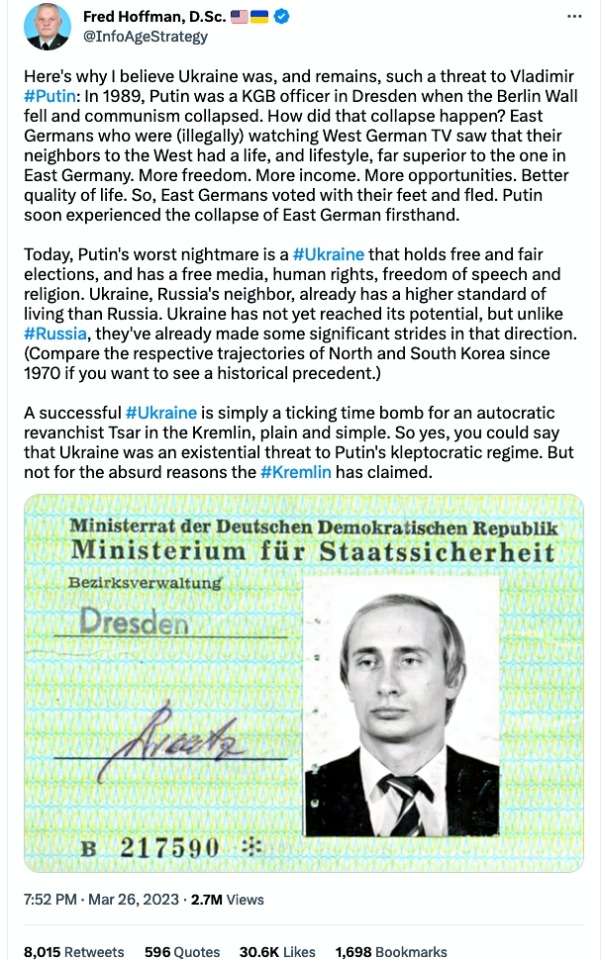
^^^ From @InfoAgeStrategy.
Prof. Fred Hoffman is a retired US Army human intelligence officer and US military attaché in Germany. He served in Germany around the same time Vladimir Putin was a lieutenant colonel in the KGB stationed in Dresden in the now defunct East Germany (”German Democratic Republic”).
Prof. Hoffman believes that Putin hates Ukraine because the Russian dictator sees it as a hotbed of democratic contagion which could spread to Russia. Putin blamed West Germany for corrupting the glorious communist East Germany with ideas about democracy, freedom, and higher standards of living.
Putin’s war is largely a clash of civilizations between modern Western democracies and kleptocratic autocracies. Putin’s invasion of Ukraine was essentially a declaration of war against the West. People who characterize the war as a “territorial dispute” are putting on public display their farcical ignorance of Russian history and Eastern Europe.
#invasion of ukraine#fred hoffman#vladimir putin#kgb#east germany#ddr#democratic contagion#putin's hatred of ukraine#clash of civilizations#putin's war against the west#revanchism#россия#владимир путин#кгб#бывший ссср#путин хуйло#восточная германия#рдр#война против демократии#путлер#союз постсоветских клептократических ватников#вторгнення оркостану в україну#україна переможе#слава україні!#героям слава!
682 notes
·
View notes
Photo
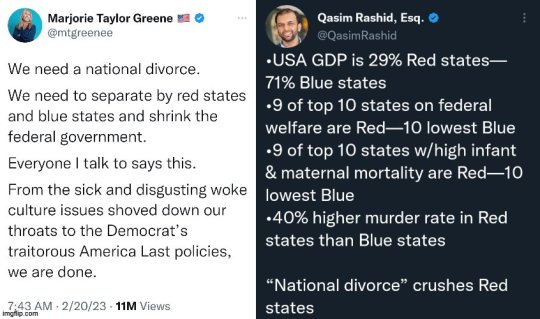
Moscow Marge.
#Marjorie Taylor Greene#Moscow Marge#MoscowMarge#National Divorce#Civil War#Qasim Rashid#Red States#Blue States#GDP#welfare#infant#maternal#mortality#murder#murder rate#Gross Domestic Product#Woke#Democrat#Democrats#Democratic#traitor#sedition
344 notes
·
View notes
Text
The new meme template just dropped. Go nuts with it!

#rose quartz su#slippin kimmy#saul goodman#abortion#reproductive rights#agit prop#agitprop#leftism#feminism#radicalization#barbie 2023#centrism#liberal#democrats#meme template#kimspiration#second american civil war#girlblogging#lana del rey
76 notes
·
View notes
Text
Just leaving this here.
Feel free to reblog.
Fuck Erdogan and his cronies for this shit!
Feel free to reblog.
#dougie rambles#political crap#middle east#syria#syrian civil war#north and east Syria#rojava#turkey#assyria#bethnahrin#kurdistan#levant#fuck Erdogan#terrorism#war crimes#sdf#Syrian democratic forces#Syrian democratic council#leftism#anti imperialism#anti fascism#afrin
25 notes
·
View notes
Text
Guess which 11 states cause 99% of our problems.
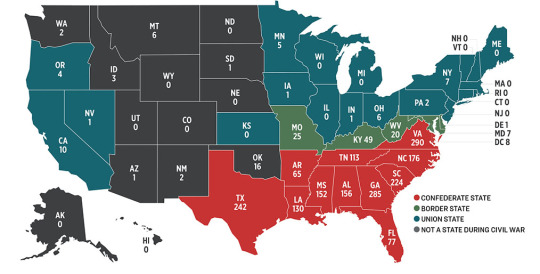
Update: The numbers represent the Confederate memorials (including statues, roads, buildings, etc.) in each state.
Source: The Southern Poverty Law Center
#confederacy#union#civil war#war of northern aggression#republican#conservative#gop#libertarian#politics#voting#election#democrats
443 notes
·
View notes
Text
The Scalawag Roy Eugene Barnes, the Disgraced Governor of Georgia, testified on behalf of Fanni Willis as a character witness of sorts this week regarding her corruption. He was the 80th Governor of GA. He is responsible for removing the battle flag from the GA state flag. He’s still a scalawag!
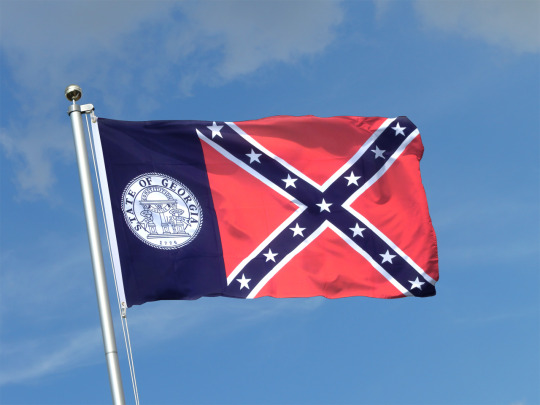
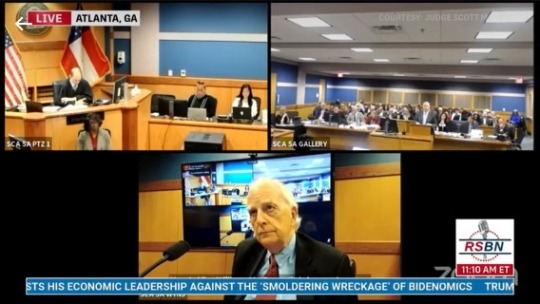


#georgia#Fanni Willis#civil war#southerners#confederate#states rights#history#atlanta#gravestones#confederacy#democrats are corrupt#corruption#debasement#alabama#scalawag#carpetbagger#robert e lee#virginia#flaggers#Texas#central texas#texasmade#missouri
12 notes
·
View notes
Text

[The following is from Republican Congressman Dusty Johnson's interview with CNN, discussing the ongoing turmoil caused by MAGA Republicans in the U.S. House of Representatives (Oct 2023)]
"If we don't change the foundational problems within our [Republican] conference, it's just gonna be the same stupid clown car with a different driver."
"If Jim Jordan and Steve Scalise can't figure out how to deal with that saboteur (Matt Gaetz), we're just going to have another blow-up, whether it's two weeks, or six weeks, or eight weeks. You know, Matt Gaetz and those hardliners, they're a real problem. And I don't think the pyromaniacs are going to be satisfied after they burn down one house. I think they're going to have an itching to go burn down a couple more."
"These guys, chaos artists, decided that we need to take a couple of weeks off from governing the country. They've been playing silly D.C. parlor games about leadership rather than having us actually get things done. And because they crave the attention, because they crave the chaos, it doesn't end here. We've got some real work to do if we're going to be a real big boy, big girl, grown-up party to govern the House." (source: Rep. Johnson's interview)
#gif#congress#current events#politics#republicans#maga#government#us politics#republican#democrats#political#aesthetic#house of representatives#civil war#gifs#Dusty Johnson#clown car#Matt Gaetz#CNN#beauty-funny-trippy#chaos#Jim Jordan#Steve Scalise#Speaker of the House
21 notes
·
View notes
Text

251 notes
·
View notes
Text

Democrats should prepare for very very low voter turnout in November. In fact, it maybe the lowest voter turnout ever. That’s what happens when you run 2 senile old ass white men against each other and actively keep third parties off ballots tho. Civil war is coming when your choices are no and hell no.
#joe biden sucks#Donald trump sucks#low voter turnout#November 2024#american civil war#free palestine#nuke Israel#gaza genocide#political memes#democrats#republicans#green party#cornel west#mst memes#mystery sovcit theater memes#mistaken con man#garth nader memes#tumblr memes#dankest memes#pathetic3
7 notes
·
View notes
Photo

LETTERS FROM AN AMERICAN
April 9, 2023
Heather Cox Richardson
On April 9, 1865, General Robert E. Lee surrendered the Army of Northern Virginia to General Ulysses S. Grant of the United States Army at Appomattox Court House in Virginia. Lee’s surrender did not end the war—there were still two major armies in the field—but everyone knew the surrender signaled that the American Civil War was coming to a close.
Soldiers and sailors of the United States had defeated the armies and the navy of the Confederate States of America across the country and the seas, at the cost of hundreds of thousands of lives and almost $6 billion. To the northerners celebrating in the streets, it certainly looked like the South’s ideology had been thoroughly discredited.
Southern politicians had led their poorer neighbors to war to advance the idea that some people were better than others and had the right—and the duty—to rule. The Founders of the United States had made a terrible mistake when they declared, “All men are created equal,” southern leaders said. In place of that “fundamentally wrong” idea, they proposed “the great truth” that white men were a “superior race.” And within that superior race, some men were better than others.
Those leaders were the ones who should rule the majority, southern leaders explained. “We do not agree with the authors of the Declaration of Independence, that governments ‘derive their just powers from the consent of the governed,’” enslaver George Fitzhugh of Virginia wrote in 1857. “All governments must originate in force, and be continued by force.” There were 18,000 people in his county and only 1,200 could vote, he said, “But we twelve hundred . . . never asked and never intend to ask the consent of the sixteen thousand eight hundred whom we govern.”
But the majority of Americans recognized that if it were permitted to take hold, this ideology would destroy democracy. They fought to defeat the enslavers’ radical new definition of the United States. By the end of 1863, President Abraham Lincoln dated the birth of the nation not to the Constitution, whose protection of property underpinned southern enslavers’ insistence that enslavement was a foundational principle, but to the Declaration of Independence.
“Four score and seven years ago our fathers brought forth on this continent, a new nation, conceived in Liberty, and dedicated to the proposition that all men are created equal. Now we are engaged in a great civil war, testing whether that nation, or any nation so conceived and so dedicated, can long endure.”
The events of April 9 reassured Americans that they had, in fact, saved “the last best hope of earth”: democracy. Writing from Washington, D.C., poet Walt Whitman mused that the very heavens were rejoicing at the triumph of the U.S. military and the return to peace its victory heralded. “Nor earth nor sky ever knew spectacles of superber beauty than some of the nights lately here,” he wrote in Specimen Days. “The western star, Venus, in the earlier hours of evening, has never been so large, so clear; it seems as if it told something, as if it held rapport indulgent with humanity, with us Americans.”
So confident was General Grant in the justice of his people’s cause that he asked only that Lee and his men give their word that they would never again fight against the United States and that they turn over their military arms and artillery. The men could keep their sidearms and their horses because Grant wanted them “to be able to put in a crop to carry themselves and their families through the next winter.”
Their victory on the battlefields made northerners think they had made sure that “government of the people, by the people, for the people, shall not perish from the earth.”
But their conviction that generosity would bring white southerners around to accepting the equality promised in the Declaration of Independence backfired. After Lincoln’s assassination, Andrew Johnson of Tennessee took over the presidency and worked hard to restore white supremacy without the old legal structure of enslavement, while white settlers in the West brought their hierarchical ideas with them and imposed them on Indigenous Americans, on Mexicans and Mexican Americans, and on Asians and Pacific Islanders.
With no penalty for their attempt to overthrow democracy, those who thought that white men were better than others began to insist that their cause was just and that they had lost the war only because they had been overpowered. They continued to work to make their ideology the law of the land. That idea inspired the Jim Crow and Juan Crow laws of the late-nineteenth and twentieth centuries, as well as the policies that crowded Indigenous Americans onto reservations where disease and malnutrition killed many of them and lack of opportunity pushed the rest into poverty.
In the 1930s, Nazi leaders, lawyers, and judges turned to America’s Jim Crow laws and Indian reservations for inspiration on how to create legal hierarchies that would, at the very least, wall certain populations off from white society. More Americans than we like to believe embraced fascism here, too: in February 1939, more than 20,000 people showed up for a “true Americanism” rally held by Nazis at New York City’s Madison Square Garden. The event featured a huge portrait of George Washington in his Continental Army uniform flanked by swastikas.
The decision of government officials 158 years ago to trust in the goodwill of former Confederates rather than focus on justice for everyone else seemed at the time to be the honorable and best course for healing the divided nation. But it ended up protecting the Confederates’ ideology and disheartening those who had fought for the United States. “When the Union men of those States who have suffered every kind of outrage, who have been fined, mobbed, imprisoned, and have seen their Union neighbors hunted and tortured and hung for their fidelity to the Government, see… a conspicuous, leading traitor hastily pardoned by the President that he may become Governor,” wrote Harper’s Weekly a little more than a year after Lee surrendered,
“When they see members of the Cabinet deliberately annulling the law of the land in order to appoint late rebels to national offices, while the most noted and tried Union men in the insurgent States ask in vain for such recognition of their fidelity, how can such men help bitterly feeling the contemptuous scorn with which the triumphant rebels regard them? How can they help asking why they might not as well have been rebels? How can they help the conviction that the policy of the Executive is conciliation of rebels and not recognition of Union men, or avoid asking with intense incredulity whether this is the way in which treason is to be made odious?”
—
LETTERS FROM AN AMERICAN
HEATHER COX RICHARDSON
#history#Letters From An American#Heather Cox Richardson#American Civil War#declaration of independence#All ... are created equal#equality under the law#democracy#democratic rule#rule of law
30 notes
·
View notes
Text
youtube
Bloodbath? Insurrection?
4 notes
·
View notes
Text
Why We Fight (Old Essay).
This essay was originally posted on December 20th, 2022.
This essay was written after a particularly draining year in all aspects - foreign and domestic. In this one I dig deep to offer up some encouragement to go on, in thinking about why I (and others) keep up the fight against a world that seems dead set on grinding us into the dust in new and cruel ways.
(Full essay below the cut).
Well, folks. It’s been a hell of a year, hasn’t it?
I feel like since 2016, every year has been “the longest year ever” (or maybe 2016 itself has just been the longest year ever and is still going on). But I really do feel like 2022 has taken the cake so far. We have an ongoing major land war in Eastern Europe involving a nuclear-armed totalitarian imperialistic aggressor, fascist anti-LGBTQ terrorism running rampant in the United States, and everything else bad that you could imagining kicking off all over the world. It’s been an exhausting year that’s felt more like a decade than 365 days. With the state of things, it’s understandable that some folks may be feeling very burned out, grim and dour about our future and the future of the world in general.
As many of you well know, I oppose doomerism in all its forms – for a variety of reasons, but if for nothing else out of spite and a desire to spit in the universe’s eye. I do still truly believe we can make the world a better place – though that will require a great amount of blood, sweat, and tears on our parts. But I recognize things will likely get worse before they get better. I too, still go through periods of being discouraged or temporarily or tactically “doomer” even if I still have hope in the long run. It’s understandable and inevitable as a human being.
It was in one of those slumps recently when I started thinking about what I wanted my last essay of 2022 to be. Thinking about how I felt in that moment and how others felt at home and abroad, I decided maybe what folks might need is a reason to keep going. We spend so much time being bombarded with media meant to break our will and get us to give up whatever struggle we’re involved in to make things suck less, that we could do with a few explicit words of encouragement. Everyone needs a reason to keep up the struggle in whatever form that takes, against the forces that would seek to bring destruction and despair to all corners of the earth. In so many words, sometimes we need to be reminded of the answer to the question “why we fight” or “why should we fight?” That’s what I’m hoping to give you in this last essay of the year before I go sleep for two weeks straight and hope things are better when I wake up.
The Thing That the Essay Title Promised You
So, I’m going to do you all a favor right now (you’re welcome). I’m going to give you the bottom-line up front(ish) so if you just want the basic takeaway of this essay and don’t feel like reading the rest, you got it:
We fight because we’re worth it.
That’s it.
Whether its ourselves, or our friends and loved ones and others who matter to us, we all have inherent meaning and value as people. As we go about our daily lives, we all have the capacity to create and do amazing and beautiful things in the course of our existence; things that make ourselves and all those other people we care about feel a wide array of positive emotions. Whether it’s writing a book or drawing a picture or even just hanging out with someone and telling them a joke or a funny anecdote and making them laugh or taking the time to listen to them if they’re having a bad day, we all have the capacity to do things that make living worth it – both for ourselves and for others. In a way, it’s the world’s most positive feedback loop.
Maybe I’m being soft and lame and cringe, but I think that’s wonderful and worth protecting so that it can continue and flourish all over the world. We fight because we all have the capacity in us to do good things for ourselves and others and that’s absolutely worth protecting. We fight because we can make the world a better place in which for us to do those things that make life worth living and to show our inherent value and worth and meaning as people.
In a perfect world, we wouldn’t have to fight for our inherent right to exist and live our best lives. However, as it’s become painfully obvious to us, a perfect world is not possible and just a better world is a struggle to get to. There are those who would deny us this right for a variety of reasons.
For some it’s just a matter of simple greed in regard to money, power, and more; people who in order to achieve their goals requirement need to exert their control over us and deprive us of the means and freedom to be ourselves and be happy.
For others, they have convinced themselves or been convinced by ideology of various kinds that their happiness and self-worth can only come through a world in which they have total control to exert their world view on others and can subjugate and destroy all those who they see as a threat to their goals or conflict with their worldview – particularly minority groups of various kinds.
Others still – for one reason or another, be it nature or nurture – are just full of hate and want to do harm.
In some cases, it may be “all of the above” (and more) motivating certain people to launch campaigns of political, military, and economic domination all over the world. Whatever the motivation, there are those who would deny us the right to live as ourselves and they must be resisted in order to protect our worthiness to exist and do what we do.
Ok, So Now What?
Alright. I’ve told you why we fight, but you’re still here because you want more. Rather: you’re asking, what are you actually supposed to do now?
Naturally, as an analyst, my instinct here is to throw down a smoke bomb and disappear in the ether because I am allergic to giving definitive answers. I am going to fight this impulse and at least try to give you some broad ideas of what we should be doing (“we” just being people the world over in general), with the major caveat that there is no one size fits all solution to the myriad problems we face internationally in the fight against the forces of reaction. We have a great many tools in our toolbox, some of which are ideal for some situations, and others not so much. It all depends on the nature of the threat and the environment it’s occurring in, among other factors. There are no quick and easy fixes that apply in every single case.
To elaborate a bit more on “use the right tool in the right situation” analogy, it helps to think of what we’re involved in as a global total war on the forces of reaction. In some cases, we fight back using non-kinetic political and economic means; in other places and situations, violent or military force may be necessary. But it has to be understood that all of humanity is in the midst of a struggle against the forces of authoritarianism, totalitarianism, fascism – whatever you want to call it – in all aspects, be they physical or otherwise. That means we will need to fight back in different ways at different times depending on what is more appropriate, expedient, or necessary. With all that in mind, the battles we fight and the means we use to fight them will vary widely.
To start on the softer end of things, while I know many of you are likely disillusioned with electoral politics and feel as though your vote doesn’t matter, in many cases your vote does in fact have an impact and is necessary – if nothing else, as a tactical act to minimize harm against those who are the most vulnerable.
I harbor no illusions about the flaws in our system – nor do I believe that voting alone will save the world and change society. But to disregard the tool of voting completely is foolhardy politically speaking. At the end of the day, I am in fact a democratic socialist with an emphasis on the democratic and while I will continue to advocate for a more just and equitable democratic system than the one we currently have, it still has its uses and applications and we have to deal with it. So, as much as it may make you roll your eyes, voting is still one action you can and will often need to take.
However, as I said, voting alone does change things for the better. Once again, while I am very much a democratic socialist with a heavy emphasis on the democratic, I am not an electoralist. To put it plainly, while I believe in participating in electoral politics as part of politics I do not believe that voting alone will save us and bring about the change for the better that is so badly needed in our society.
Political and economic action beyond voting is not only possible but necessary in this battle. Labor organizing, strikes, and other industrial action have been and will be crucial in achieving change for the better. Beyond action among labor, other forms of civic activism and organizing to bring about change and apply pressure on authorities regarding key issues will also be essential – as it has been in the past for issues like civil rights and voting.
In some cases, around the world, certain situations occur that when all else fails and there is no other option, armed resistance and organized military action is necessary and the only way to defend yourself. Obviously, this is has been most visible in Ukraine following Russia’s unjustified, imperialistic invasion earlier this year, which has required mass resistance in Ukraine on a national scale among all its people.
As I often say, even if your country as a whole doesn’t want war, sometimes an outside aggressor will see fit to bring it to you regardless for whatever reason, and your only option for survival is to defend yourself with force of arms – be it in your country’s officially mandated military and paramilitary forces or by other methods of armed resistance. For those of us not present in places under attack in this manner, expressing support and solidarity through fundraising, donating of essential supplies and equipment, or encouraging elected officials or those in power to provide aid are all measures that can be taken to assist those that are fighting for their lives and rights.
Aside from an outside invader, we have seen all too often when the armed aggressor seeking to deprive you of your civil and human rights is not an invading army attacking your government but your government itself. You can pick from a wide variety of examples ongoing in the world today, but one of the freshest and also consistently escalating in the civil war in Burma (Myanmar) which has seen large sections of the population – with many young people desiring a better future – rebelling against the fascist military junta that seized power in a coup.
I feel like the threshold for violence here can sometimes (not always, but sometimes) be higher and murkier in comparison to the more cut and dry cases of being outright invaded by a foreign power. However, we’ve seen plenty of cases where a government has turned against peaceful and non-violent movements for change with overwhelming violence and murder that leave its people no choice but to take up arms against them in defense of their rights, such as the initial protests of the Arab Spring that led to the civil wars in Libya, Syria, and elsewhere. It’s not something to be taken lightly, but in many places unfortunately ends up being the only option.
The shoe, of course, can be on the other foot as well. Sometimes the forces of reaction deadset on oppressing and killing you aren’t coming from within your government (though they may have allies within it) but are in fact actively trying to subvert it or destroy it and replace it with their own twisted vision, causing a rebellion and civil war in the process. There are historical examples of right-wing rebellions or insurrections elsewhere in the world, such as theocratic groups like the Islamic State or Taliban in Southwest Asia, or the Lord’s Resistance Army in Africa. But here in the United States we still have a recent experience of this in an unsuccessful attempt at seizing power in the January 6th Insurrection following the 2020 Presidential Election – which at time of writing, the Congressional panel on the subject has just recommended charges to the Justice Department against former President Donald Trump for his role in the attempted coup (we’ll see if anything actually comes of it).
On the topic of the United States – where I live, and I imagine most of those reading this essay live – I don’t think we’re on the brink of a civil war like we’ve seen in Burma or Syria or elsewhere (as much as some in certain corners of the internet who fetishize the idea of that kind of collapse may wish that were true). I still think the risk of something like this happening here is somewhat low, though A.) it’s not near as low as I’d like it to be or it should be; B.) that doesn’t mean we shouldn’t be vigilant to make sure things don’t escalate to that point.
But it is increasingly hard to deny that even if we are not in a “civil war” as we might imagine that we are in the midst of some other kind of campaign of politically motivated armed violence. I used to think that, rather than a full on “civil war”, we were fast approaching something more in the league of The Troubles of Northern Ireland or the Years of Lead in Italy. Its only lately that I’ve realized that we’re already well into that kind of situation and probably have already been there for some time before I finally came to terms with it.
Not only are we well into such a state of affairs, but it is also increasingly obvious that – barring some massive sea change in national sentiment and political will – that we can only sporadically count on the authorities to do anything to challenge the waves of fascistic terrorism we find ourselves victim to, if at all.
The state of affairs we find ourselves in now was most recently demonstrated by the act of right-wing terrorism against a drag show at a LGBTQ bar in Colorado that occurred earlier this month. In the case of that shooting, more loves were kept from being loss by the patrons of that bar aggressively fighting back against their attacker. This demonstrates what I think is the only option in this case of holding the line while we fight for change on other fronts. While I believe we shouldn’t seek out trouble in the current environment, we should be by all means prepared to deter it from occurring and fight back against it as communities where it occurs to enable ourselves to be able to live our lives.
Those supporting the forces of reaction that would seek to destroy LGBTQ and other marginalized peoples and their allies for whatever insane reason, need to be shown that people will defend themselves and that there can and will be consequences for their actions if they insist on following through with their violent fantasies and that they take their life in their own hands when attempting violence against the innocent. Quite simply put, the only sensible solution here is a domestic version of what I have been advocating in foreign policy: “don’t start none, won’t be none” or “fuck around and find out.” It’s a somewhat grim proposition, but when we can’t depend upon the state and other authorities to do the right thing, folks should be prepared to defend themselves when in vulnerable situations.
In Case You Forgot Already: We’re Worth It.
We live in “interesting” times to put it mildly. There is much to be discouraged about, to be angry about, to be fearful of. But we can’t let those emotions be channeled into despair. We can’t let all of the manmade horrors beyond our comprehension swirling around us like ghastly apparitions at home and abroad distract us from the main point: we’re worth it.
We as people have inherent value – and by “value” I don’t mean value in the way a venture capitalist or economist would think about it. we have emotional and philosophical value. We are worth protecting so that we can enable ourselves and others to flourish and reach our full potential. So, the next time you’re doomscrolling your way through a major historical event on social media, try to keep that in mind. Keep that in mind when you’re at the ballot box, on the picket line, in the midst of a protest or act of civil disobedience, or learning to defend yourself by whatever means against those who would threaten your life. We are worth it. The struggle for a better world is far from over. Our future is far from set in stone and time is not, in fact, a flat circle. Those who would seek to oppress or destroy us are far from victorious and their victory is far from certain. We are worth fighting for. Keep fighting the good fight in all its forms all over the world.
To all of those celebrating anything this time of year, I wish you a peaceful and restful holiday season. To everyone out there, I wish you all a Happy New Year that hopefully – if nothing else – brings us somewhat closer in some way to the better future we all deserve. Thank you for taking the time to read what I had to say past, present, and future. Stay safe.
#essay#War Takes#War Takes essay#socialism#leftism#democratic socialism#far-right#fascism#terrorism#domestic terrorism#insurrection#internal conflict#civil war#war#anti-fascism#authoritarianism#anti authoritarian#anti doomerism
10 notes
·
View notes
Text
Nikki Haley and the Civil War
Well, Ms. Haley stepped in “it” the other day. She had the audacity to claim that the Civil War was about states’ rights. From that, it was implied that the Civil War was not about slavery. And thus, the comment created a tempest for Ms. Haley.
To be fair to South Carolinian, Ms. Haley parrots what many in the South believe. So the crux of the question is, what was the war about? Was the Civil War fought over slavery or state rights?
The answer is simply YES.
WHAT? That is a cop-out! Well, actually not, follow me here. It’s actually quite simple: the Civil War was about States’ Rights to have legalized slavery. You can not decouple one from the other, and doing so can be considered wrong on both accounts.
When trying to support this, I can compare it to abortion, whose rights prevail? The unborn or the “host” mother? Honestly, it’s both, and unfortunately, the argument should be over whose rights prevail and not each issue separate.
The problem today is how debates are framed. We are taking an apple and an orange argument, then debating on which is best based on the individual fruit without looking at the other one. And with the apple/orange debate, there are no winners.
Back to Miss Nikki, is she a racist because she said the Civil War was about states’ rights? There is no evidence of this, and honestly, in the South, racism is almost dead because the races are so intertwined. Everyone is trying to find the KKK under every rock. Does the KKK exist? YES. Is It relevant? NO. One cannot have a friend who is black and believes in racism, and to find a person in the South who does not have friends of the other race is almost impossible.
IMHO, all this is being used to discredit an opposing opinion without actually addressing said “opinion.” Once the racist charge sticks, the accused becomes tainted to the point that they are not able to defend their original position because time is sucked into the racist vortex.
So was the Civil War about “states’ rights” OR “slavery”? Or was the Civil War about “states’ rights” AND “slavery”? In essence, the Civil War was about “states’ rights,” and the issue that was questioning the rights of the state was the right to have legalized “slavery.“
In conclusion, remember the “South” wanted the Constitution to include blacks/slaves to have full rights. The North wanted no rights for blacks/slaves. The compromise arose to count each black/slave as 3/5th a person. So, trying to discredit the Constitution over the 3/5th clause was actually put there because the “North” who went to war over “slavery” wanted to remove their personhood. Was this because of racism? No, it was about power. They knew the power would be in the South if those extra voters were included in the rolls. And that is normally why the racist card is played since the underlying issue would expose their real feelings!!
5 notes
·
View notes
Text
Took me a while to find this article in English.
I eventually found it. Just took time.
Once again, fuck Erdogan and his cronies for this shit.
Slaughtering Assyrians, Armenians and other Christians (and other peoples too) in Syria.
Despicable crap!
Not defending Assad either btw. He’s a murdering chauvinist bastard.
Reblog the shit out of this.
#dougie rambles#political crap#news#Asia#middle east#assyria#bethnahrin#syrian civil war#syria#Syriac union party#rojava#north and east Syria#qamishli#leftism#turkey#fuck Erdogan#anti fascism#anti imperialism#Syrian democratic council#dawronoye#reblog this#reblog the shit out of this#assyrians#Assyrian people#armenians#fuck Assad
7 notes
·
View notes
Text
Oh. Big Boss IS William Walker. Hes a mercenary hired to protect latin american democracy only to betray it and bring about something much worse than he was supposed to be fighting. That's why the game is named after Walker. Big boss is William Walker, posing as el Che.
#mgs#of course! of course#except. Big boss is spreading Military Privatization and not slavery.#because this is the 1970s not the 1850s#of course#somewhat obscure historical figure to base your MC on but i can respect that#i imagine the real Nicaraguan civil war was more complicated however the game frames it as Democratic Party vs Conservative Party#so i will as well
2 notes
·
View notes